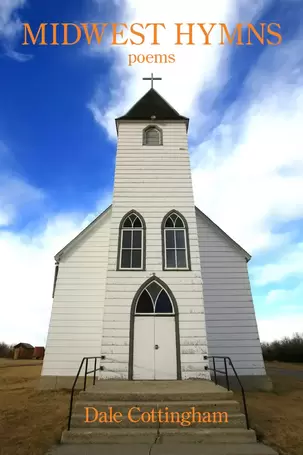Dale Cottingham’s collection, Midwest Hymns, reads as a meditation on a man’s journey through life’s myriad challenges, and healing through becoming one with nature and its cycles. Cottingham’s muse is the family and land that raised him, and each of these poems act as a patchwork in making an overall warm and nostalgic reading experience. Midwest Hymns is divided into four sections, each containing ten or more poems. While the sections are given no specific titles, it is evident that the groupings of poems are deliberate in telling a broader narrative about reflection and healing oneself. The first section primarily focuses on the speaker’s family history and childhood memories on the land they grew up on in the Midwest. This section is the most bittersweet, as it is tinged with the realization that the speaker is unable to return to these simpler times. The poem “Two Trees” acknowledges this internal conflict: "Come spring, one tree, Even though the land where this speaker’s memories were made still remains, those who made the memories so special have been lost to time. Much like the thriving tree in this poem, our speaker holds onto the dead, keeping them alive in their own way. This poem in particular highlights Cottingham’s talent of attributing meaning to every part of the desolate comfort of the Midwest setting. He further explores this in the second section of the collection, which also makes use of slice-of-life depictions of setting to infuse sentimentality into his verse. The third section of this collection has more reflections on life and death, with a majority of these poems focusing on the loss of the speaker’s father. In the poem, “Photo of My Father, Kansas City, 1946,” the speaker ruminates on the relationship between him and his father: "I never asked. He never said. The “show don’t tell” rule for poetry is cleverly referenced here to reveal how the speaker was able to come to a place of acceptance after their father’s death. Grief is complex and can’t always be put into words. While many may tell you how to heal, only poetry—the truth in its purest form—can set one free. The collection's fourth section culminates in a celebration of a quiet, simple life. The speaker, who has lived on this land their entire life, now has finally come to understand its cycles. The poem “Prairie Invitation” paints this picture best: "Sit with me on this The speaker invites the reader here to join them in the knowledge that although nature is giving, it also must take eventually. While we can dwell on the fact that it must take, a happy life can be achieved by appreciating all that it gives while we are here to enjoy it.
What I learned from Cottingham’s Midwest Hymns is that while death is inevitable, it also begets new life. While we may mourn winter, spring is never too far behind. This is all exquisitely captured in Cottingham’s enriching verse filled with some of the most thought-provoking nature imagery I’ve seen in poetry in quite a while. This is truly a collection for everyone, as it reminds readers that the land we live on is a treasure and should not be taken for granted.
0 Comments
Leave a Reply. |
Archives
July 2024
Categories
All
|
|
Glassworks is a publication of Rowan University's Master of Arts in Writing 260 Victoria Street • Glassboro, New Jersey 08028 [email protected] |
All Content on this Site (c) 2024 Glassworks
|


 RSS Feed
RSS Feed
